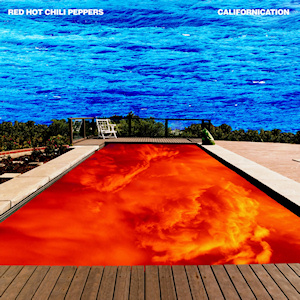
Californication (album)
Californication is the seventh studio album by U.S. rock band Red Hot Chili Peppers, released on June 8, 1999, on Warner Bros. Records. It was produced by Rick Rubin. Along with Blood Sugar Sex Magik, Californication is one of the band’s best-selling albums.
Californication
Californication marked the return of guitarist John Frusciante, who'd previously appeared on Mother's Milk and Blood Sugar Sex Magik, and shifted the band's style. The lyrics incorporated the sexual innuendos already associated with the band, but added themes including death, suicide, California, drugs, globalization and travel.
Californication is the Chili Peppers' most commercially successful studio release internationally, with more than 15 million copies sold worldwide, and more than seven million in the United States alone.[3] As of 2002, the album had sold more than four million copies in Europe.[4] The record yielded several hits for the band, including "Otherside," "Californication" and the Grammy Award-winning "Scar Tissue." Californication peaked at number three on the U.S. Billboard 200.
The record marked a significant change in style for the band: Rolling Stone's Greg Tate noted that "while all previous Chili Peppers projects have been highly spirited, Californication dares to be spiritual and epiphanic".[5] Another critic, Billboard's Paul Verna, mentioned that the album brought out "the group's softer, melodic side", as opposed to their previous six albums.[6]
Background[edit]
In 1991, the Red Hot Chili Peppers released their breakthrough album Blood Sugar Sex Magik on Warner Bros. Records.[1] The album sold seven million copies in the United States, and became a seminal component of the alternative rock explosion in the early 1990s.[1][7] After the release of Blood Sugar Sex Magik, the guitarist John Frusciante left the Red Hot Chili Peppers, as he became overwhelmed by the band's newfound popularity.[8] Dave Navarro was hired as his replacement, and incorporated elements of heavy metal and psychedelic rock on the band's 1995 album One Hot Minute.[9] The album failed to match the critical and commercial success of its predecessor, and Navarro left in early 1998.[1]
In the years following his departure, Frusciante became addicted to heroin and cocaine, leaving him in poverty and near death.[10] Friends convinced Frusciante to enter drug rehabilitation, and in 1998, he rejoined the Red Hot Chili Peppers at the insistence of bassist Flea.[11] While in rehab, Frusciante came to terms with rock stardom; in a Rolling Stone interview, he said: "It got into my head that stardom was something evil. If you were a rock star, you were trying to put people on. I don't see it that way anymore."[11] With Frusciante, the Red Hot Chili Peppers began brainstorming ideas for a new album. Flea suggested the group record an album with electronic influences, akin to Zooropa by U2.[12] When the band was turned down by multiple electronic music producers (including David Bowie), they decided to instead pursue an alternative rock direction with throwbacks to their roots.[12][13]